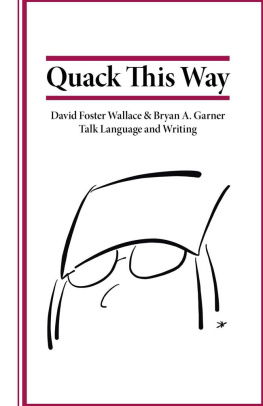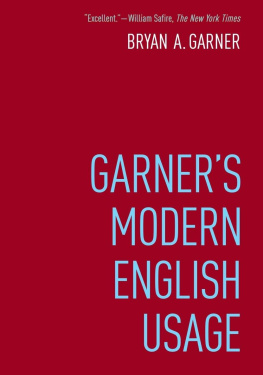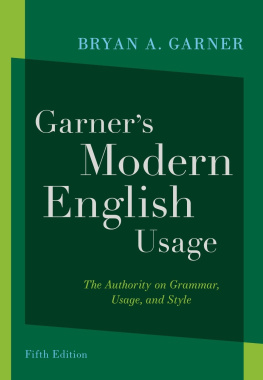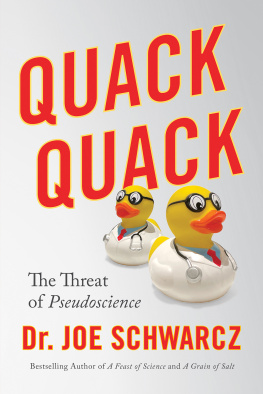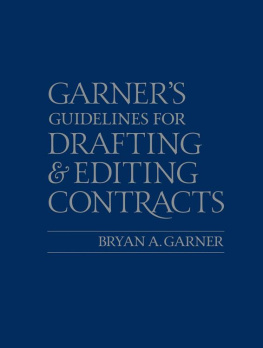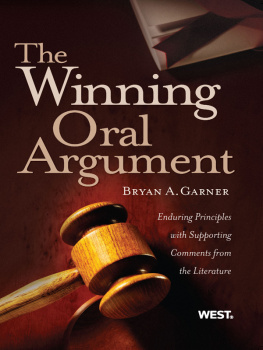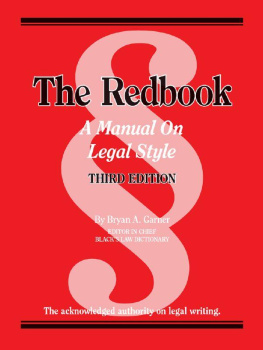Bryan Garner - Quack This Way
Here you can read online Bryan Garner - Quack This Way full text of the book (entire story) in english for free. Download pdf and epub, get meaning, cover and reviews about this ebook. year: 2013, publisher: RosePen Books, genre: Art. Description of the work, (preface) as well as reviews are available. Best literature library LitArk.com created for fans of good reading and offers a wide selection of genres:
Romance novel
Science fiction
Adventure
Detective
Science
History
Home and family
Prose
Art
Politics
Computer
Non-fiction
Religion
Business
Children
Humor
Choose a favorite category and find really read worthwhile books. Enjoy immersion in the world of imagination, feel the emotions of the characters or learn something new for yourself, make an fascinating discovery.
- Book:Quack This Way
- Author:
- Publisher:RosePen Books
- Genre:
- Year:2013
- Rating:5 / 5
- Favourites:Add to favourites
- Your mark:
- 100
- 1
- 2
- 3
- 4
- 5
Quack This Way: summary, description and annotation
We offer to read an annotation, description, summary or preface (depends on what the author of the book "Quack This Way" wrote himself). If you haven't found the necessary information about the book — write in the comments, we will try to find it.
Quack This Way — read online for free the complete book (whole text) full work
Below is the text of the book, divided by pages. System saving the place of the last page read, allows you to conveniently read the book "Quack This Way" online for free, without having to search again every time where you left off. Put a bookmark, and you can go to the page where you finished reading at any time.
Font size:
Interval:
Bookmark:
Quack This Way
Quack
This
Way

David Foster Wallace &
Bryan A. Garner Talk
Language and Writing
February 3, 2006
Hilton Checkers Hotel
Los Angeles, California
David Foster Wallac e (19622008) was probably the greatest writer of his generation. He wrote the acclaimed novel s Infinite Jes t an d The Broom of the Syste m , as well as the story collection s Oblivio n , Brief Interviews with Hideous Me n , an d Girl with Curious Hai r . His nonfiction includes the essay collection s Consider the Lobste r an d A Supposedly Fun Thing Ill Never Do Agai n , together with the full-lengt h Everything and Mor e and the posthumously published commencement speec h This Is Wate r . He committed suicide in September 2008.

Bryan A. Garne r (b. 1958), author and lexicographer, has written more than 20 books on English usage, legal writing, advocacy, business writing, and more, includin g Garners Dictionary of Legal Usag e , Garners Modern American Usag e , an d Reading Law: The Interpretation of Legal Text s (with Justice Antonin Scalia). Garner is the editor in chief o f Blacks Law Dictionar y and Distinguished Research Professor of Law at Southern Methodist University. He founded LawProse, Inc., a Dallas-based training and consulting firm, in 1990.


RosePen Books, Dallas, Texas 75254
2013 by Bryan A. Garner
All rights reserved. Published 2013.
Printed in the United States of America
IBSN-13: 978-0-991-11813-7
Cover illustrations by L.W. Montgomery, Boise, Idaho.
Contents
Introduction
It must have been late 1999 when my secretary, Andrea, excitedly proclaimed that David Foster Wallace had just called the office and spoken to her.
Who? I said.
David Foster Wallace!
Whos he?
She explained that he was a major, major writerthe author o f Infinite Jes t . I knew the book.
Hes writing something about you, she gushed.
Why didnt you put me on the phone with him?
I offered, Andrea said, but he refused. He said he didnt want to speak with you directly. He just wanted some basic information about you. Apparently hes reviewing your usage book.
I went on with my day and put it mostly out of my mind. Apparently I wrote him a note in March 2000a note I no longer have.
Then, a few weeks later, I received a massive manuscript from Bloomington, Illinois. It was Davids manuscript of Tense Present. The cover letter may have been the first of Davids writing Id ever read. It was self-effacing, apologetic, and endearing. He kept insisting that I shouldnt feel obliged to read the whole review, even though hed worked a whole bloody two months on it. He wrote: I usually hate it when people send me their work to read unsolicited, so Im bending way over backward here to assure you that I enclose it with no expectations and nothing but good wishes.
But of course I did read it, and it was enormously impressive.
It took awhile for Tense Present to get published. Originally commissioned b y The New Republi c , it was rejected by the editors there as unwieldy. Then it spent some time (as I was later to learn) a t The New York Review of Book s . In the end, it appeared as the cover article o f Harper s in April 2001. Th e Harper s editors cut the piece in half but showed real creativity in printing it on a bluish paper in the middle of the magazine, as if it were a special section produced separately. They managed to include 52 of the 124 footnotes in his piecewhich ended up, in the full version published i n Consider the Lobste r (2005), more than twice as long. That version is called Authority and American Usage.
The review is a long, laudatory piece. It changed my literary life in ways that a book review rarely can.
Things began happening that had never happened before. For example, in May 2001, a month after the review appeared, I happened to be in Cambridge, Massachusetts, at the Harvard Co-Opthe universitys main bookshop. I ducked into the shop because I had 15 minutes to kill before a dinner with a friend. With two linguistic books tucked under my arm, I went to the checkout line and stood behind a man I immediately recognized as Pulitzer prize-winner Anthony Lewis. I had met him the year before at a dinner for the American Law Institute, and I considered whether to reintroduce myself. I decided not to but instead to respect his privacy and let him get on with his afternoon. He seemed mildly fretful about getting through the checkout line, and I figured he might be writing a New York Time s editorial in his head, working against a tight deadline. Finally he got to the front of the line and handed the cashier his one book for purchase.
It was m y Dictionary of Modern American Usag e (as it was then called), with its distinctive red cover. So I approached him after all, slightly interrupting his transaction, and introduced myself. Bryan! Ive just been reading the Wallace review i n Harper s , and I hastened over here to get the book before finishing the review.
We had a good chat.
Now what are the chances of that? Id had a few minutes to spare before meeting with a friend. Id gone into the Harvard Co-Op to take a whirlwind scan of the reference, linguistics, and law sections; and Id rushed to the checkout line at the precise moment when Id be in line behind Anthony Lewis, who was buying my book.
Another remarkable thing about that afternoon: the Co-Op had stocked about 20 copies of my usage book, piling them on the floor in the reference section as well as displaying them prominently on the shelves. Never before had I seen more than two copies of one of my books in a bookstoreapart fro m Blacks Law Dictionar y in law-school bookstores.
This was all new to me.
A few weeks before, I had received a call from a Boston public-radio station asking whether Id participate in a joint interview with David Foster Wallace. He had requested my participation. I agreed, of course. It was a fascinating interview, and it was the first time we spoke to each other. (We still didnt meet, though: we were both calling into the station.) He called me Mr. Garner throughoutas he would for many months after. The interview can still be heard at http://theconnection.wbur.org/2001/03/30/english-language-usage .
Soon we were corresponding intermittently. He wanted to see one of my legal-writing seminars in Chicago. I said Id be delighted, if we could arrange it.
Then, in April 2002, the State Farm Insurance Company in Bloomington, Illinois, asked me to present one of my private seminars to about 100 of its lawyers. I wrote to David to ask whether hed like to have dinner the night before. Yes! came the answer.
He wanted to attend the seminar as well. This, I thought at the time, might be a problem. My client was paying a significant fee for an in-house seminar. They were insurance-company lawyers. Stalwart conservativesif true to the stereotype. Id be asking to have a bandana-wearing novelist and essayist attendsomebody Id not yet seen face to face. Although I already trusted David, I ended up not trusting myself: I might not teach in quite the same way if he were in the audience. I might not do as well for the State Farm lawyers. And I wouldnt want to extract a pledge from him that he couldnt write about the event. After all, his sardonic wit might prompt him to write about my client as hed already written about the Maine Lobster Festival or the adult-film-awards festival.
Font size:
Interval:
Bookmark:
Similar books «Quack This Way»
Look at similar books to Quack This Way. We have selected literature similar in name and meaning in the hope of providing readers with more options to find new, interesting, not yet read works.
Discussion, reviews of the book Quack This Way and just readers' own opinions. Leave your comments, write what you think about the work, its meaning or the main characters. Specify what exactly you liked and what you didn't like, and why you think so.

